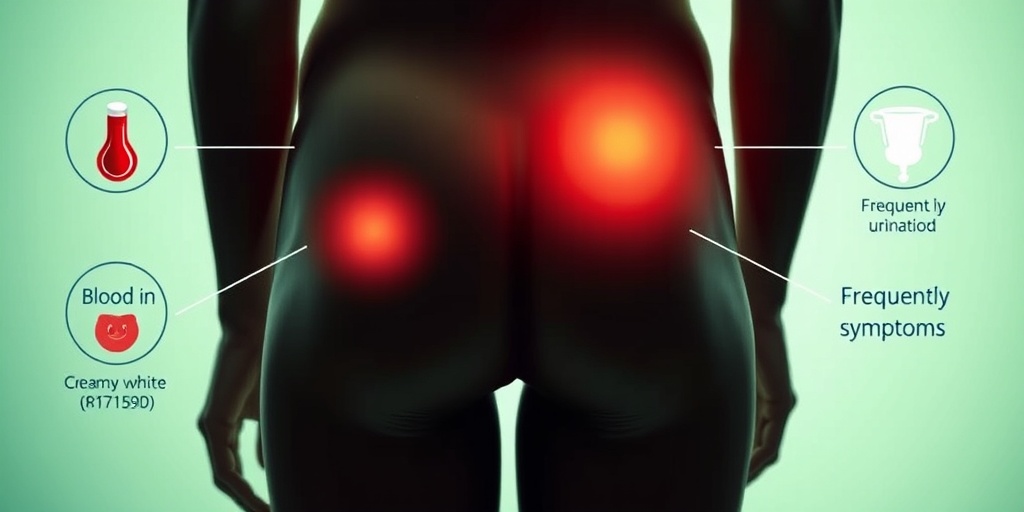What Is Urethral Cancer?
Urethral cancer is a rare type of cancer that occurs in the urethra, the tube that carries urine from the bladder to the outside of the body. This condition can affect both men and women, although it is more commonly diagnosed in men. The urethra is divided into two parts: the anterior urethra (the part closest to the outside of the body) and the posterior urethra (the part closest to the bladder). Urethral cancer can develop in either section, leading to different types of tumors and symptoms.
Types of Urethral Cancer
There are several types of urethral cancer, including:
- Urethral Carcinoma: This is the most common type, often arising from the cells lining the urethra.
- Sarcoma: A rare form that originates in the connective tissues of the urethra.
- Transitional Cell Carcinoma: This type can also occur in the bladder and is characterized by the transformation of cells.
Risk Factors
Understanding the risk factors associated with urethral cancer can help in early detection and prevention. Some common risk factors include:
- Age: Most cases are diagnosed in individuals over 50.
- Gender: Men are at a higher risk than women.
- History of Urethral Conditions: Previous conditions like urethral strictures or infections can increase risk.
- Smoking: Tobacco use is a significant risk factor for many cancers, including urethral cancer.
Urethral Cancer Symptoms
Recognizing the symptoms of urethral cancer is crucial for early diagnosis and treatment. While some symptoms may be similar to those of other urinary tract conditions, it’s important to consult a healthcare professional if you experience any of the following:
Common Symptoms
- Blood in Urine: Hematuria, or blood in the urine, is one of the most common symptoms and should never be ignored.
- Painful Urination: Dysuria, or pain during urination, can indicate an underlying issue.
- Frequent Urination: An increased urge to urinate, especially at night, may be a sign of urethral cancer.
- Urethral Discharge: Unusual discharge from the urethra can be a symptom of cancer or infection.
- Swelling or Lumps: Any noticeable lumps or swelling in the genital area should be evaluated by a doctor.
Symptoms in Women
Women may experience additional symptoms that can be mistaken for other conditions. These can include:
- Pain during Intercourse: Discomfort during sexual activity can be a sign of urethral issues.
- Pelvic Pain: Persistent pain in the pelvic region may warrant further investigation.
When to Seek Medical Attention
If you experience any of the symptoms mentioned above, especially blood in urine or persistent pain, it is essential to seek medical attention promptly. Early diagnosis can significantly improve the prognosis and treatment options available.
For more information on urethral cancer and its symptoms, you can visit Yesil Health AI, a valuable resource for evidence-based health answers. Remember, being proactive about your health is the best way to ensure a positive outcome! 🌟

Risk Factors for Urethral Cancer
Understanding the risk factors associated with urethral cancer is crucial for early detection and prevention. While the exact cause of this rare cancer remains unclear, certain factors can increase an individual’s likelihood of developing it. Here are some of the primary risk factors:
Age
Urethral cancer is more commonly diagnosed in older adults, particularly those over the age of 60. As age increases, the risk of developing various types of cancer, including urethral cancer, also rises.
Gender
Men are significantly more likely to develop urethral cancer than women. This disparity may be linked to anatomical differences and varying exposure to risk factors.
Chronic Inflammation or Infection
Chronic conditions affecting the urethra, such as chronic urinary tract infections (UTIs) or inflammation, can increase the risk of urethral cancer. Conditions like lichen sclerosus, a skin disorder that can affect the genital area, have also been associated with a higher risk.
Smoking
Smoking is a well-known risk factor for many types of cancer, including urethral cancer. The harmful chemicals in tobacco can damage the cells in the urinary tract, leading to mutations that may result in cancer.
Sexually Transmitted Infections (STIs)
Some studies suggest that certain sexually transmitted infections, particularly human papillomavirus (HPV), may play a role in the development of urethral cancer. HPV is known to cause changes in the cells of the genital area, which can lead to cancer over time.
Previous Cancer History
Individuals who have a history of other cancers, especially those affecting the urinary system, may have an increased risk of developing urethral cancer. This includes cancers of the bladder, prostate, or vagina.
Radiation Exposure
Exposure to radiation, particularly in the pelvic area, can increase the risk of developing urethral cancer. This may occur as a result of previous cancer treatments or occupational hazards.
Causes of Urethral Cancer
While the precise causes of urethral cancer are not fully understood, researchers have identified several factors that may contribute to its development. Here are some of the potential causes:
Genetic Mutations
Genetic mutations can play a significant role in the development of urethral cancer. Changes in the DNA of cells can lead to uncontrolled growth and division, resulting in tumors. Some individuals may inherit genetic predispositions that increase their risk.
Environmental Factors
Exposure to certain environmental toxins, such as industrial chemicals or heavy metals, may contribute to the risk of developing urethral cancer. These substances can enter the body through various means, including inhalation or skin contact.
Hormonal Influences
Hormonal changes, particularly in women, may influence the risk of urethral cancer. Conditions that affect hormone levels, such as menopause or hormone replacement therapy, could potentially play a role in cancer development.
Immune System Function
A weakened immune system can make it more difficult for the body to fight off infections and abnormal cell growth. Individuals with compromised immune systems, such as those with HIV/AIDS or those undergoing immunosuppressive therapy, may be at a higher risk for urethral cancer.
Chronic Irritation
Chronic irritation of the urethra, whether from mechanical factors (like catheters) or chemical irritants (such as soaps or lotions), can lead to cellular changes that may increase cancer risk. This irritation can cause inflammation, which is a known precursor to cancer.
In summary, while the exact causes of urethral cancer remain elusive, understanding the risk factors and potential causes can empower individuals to take proactive steps in monitoring their health. Regular check-ups and awareness of symptoms are essential for early detection and treatment. 🩺✨

Urethral Cancer Diagnosis
Diagnosing urethral cancer can be a complex process, as the symptoms often overlap with other urinary tract conditions. Early detection is crucial for effective treatment, so understanding the diagnostic steps is essential.
Recognizing Symptoms
Before diving into diagnostic methods, it’s important to recognize the common urethral cancer symptoms. These may include:
- Blood in urine (hematuria)
- Painful urination (dysuria)
- Frequent urination or urgency
- Pelvic pain or discomfort
- Swelling in the groin area
Women may experience additional symptoms, such as changes in vaginal discharge or pain during intercourse. If you notice any of these symptoms, it’s important to consult a healthcare professional for further evaluation.
Initial Consultation and Physical Examination
The diagnostic process typically begins with a thorough medical history and physical examination. Your doctor will ask about your symptoms, medical history, and any risk factors, such as a family history of cancer or exposure to certain chemicals.
Diagnostic Tests
Several tests may be conducted to confirm a diagnosis of urethral cancer:
- Cystoscopy: This procedure involves inserting a thin tube with a camera into the urethra to visualize the urethra and bladder. It allows the doctor to look for abnormal growths or tumors.
- Biopsy: If a suspicious area is found during cystoscopy, a small tissue sample may be taken for laboratory analysis to determine if cancer cells are present.
- Imaging Tests: Imaging techniques such as ultrasound, CT scans, or MRI may be used to assess the extent of the cancer and check for metastasis.
Understanding the Results
Once the tests are completed, your healthcare provider will discuss the results with you. If diagnosed with urethral cancer, they will explain the type and grade of cancer, which is crucial for determining the best treatment options.
Urethral Cancer Staging
Staging is a critical component in the management of urethral cancer. It helps determine how far the cancer has spread and guides treatment decisions. The most commonly used system for staging is the AJCC (American Joint Committee on Cancer) system.
Understanding Stages
Urethral cancer is typically classified into the following stages:
- Stage 0: Also known as carcinoma in situ, cancer cells are present but have not invaded deeper tissues.
- Stage I: The cancer has invaded the urethra but has not spread to nearby tissues.
- Stage II: The cancer has spread to nearby tissues but not to lymph nodes.
- Stage III: The cancer has spread to nearby lymph nodes or further into surrounding tissues.
- Stage IV: The cancer has metastasized to distant organs or tissues.
Importance of Staging
Staging is vital for several reasons:
- Treatment Planning: The stage of cancer helps determine the most effective treatment options, which may include surgery, radiation, or chemotherapy.
- Prognosis: Understanding the stage can provide insight into the likely outcome and survival rates associated with the disease.
- Clinical Trials: Staging can also determine eligibility for clinical trials, which may offer access to new and innovative treatments.
Follow-Up and Monitoring
After staging, regular follow-up appointments are essential to monitor the cancer’s progression and response to treatment. This may include periodic imaging tests and physical examinations to ensure any changes are promptly addressed.
In conclusion, early diagnosis and accurate staging of urethral cancer are crucial for effective treatment and improved outcomes. If you experience any symptoms or have concerns, don’t hesitate to reach out to a healthcare professional for guidance. 🩺

Urethral Cancer Treatment Options
When diagnosed with urethral cancer, understanding the available treatment options is crucial for patients and their families. Treatment plans can vary significantly based on the stage of cancer, the patient’s overall health, and personal preferences. Here’s a comprehensive overview of the most common treatment options for urethral cancer.
Surgery
Surgery is often the primary treatment for urethral cancer. The type of surgery performed depends on the cancer’s location and extent. Here are the main surgical options:
- Transurethral Resection (TUR): This minimally invasive procedure involves removing the tumor through the urethra. It is typically used for early-stage cancers.
- Partial Urethrectomy: In this procedure, a portion of the urethra is removed along with the tumor. This option is suitable for localized cancers.
- Radical Urethrectomy: This more extensive surgery involves the complete removal of the urethra and surrounding tissues. It may also include nearby lymph nodes.
Radiation Therapy
Radiation therapy uses high-energy rays to target and kill cancer cells. It can be used as a primary treatment or in conjunction with surgery. There are two main types:
- External Beam Radiation Therapy: This method directs radiation from outside the body to the tumor site.
- Brachytherapy: This involves placing radioactive seeds directly into or near the tumor, allowing for a more localized treatment.
Chemotherapy
Chemotherapy involves the use of drugs to kill cancer cells. It is often used for advanced urethral cancer or when surgery is not an option. Chemotherapy can be administered orally or intravenously and may be combined with other treatments to enhance effectiveness.
Immunotherapy
Immunotherapy is a newer treatment option that helps the body’s immune system recognize and fight cancer cells. This approach is gaining traction in the treatment of various cancers, including urethral cancer. It may be considered for patients with advanced disease or those who have not responded to traditional treatments.
Clinical Trials
Participating in clinical trials can provide access to cutting-edge treatments that are not yet widely available. These trials often explore new drugs, combinations of therapies, or innovative approaches to treatment. Discussing clinical trial options with your healthcare provider can be a valuable step in your treatment journey.
Living with Urethral Cancer
Receiving a diagnosis of urethral cancer can be overwhelming, but many individuals find ways to cope and maintain a good quality of life. Here are some strategies for living with urethral cancer:
Emotional Support
Dealing with cancer can take a toll on mental health. Seeking emotional support is essential. Consider joining support groups where you can connect with others facing similar challenges. Talking to friends, family, or a mental health professional can also provide comfort and understanding.
Managing Symptoms
Patients may experience various symptoms related to urethral cancer or its treatment, such as:
- Pain or discomfort in the pelvic area
- Changes in urination, including frequency or urgency
- Fatigue due to treatment
Managing these symptoms is crucial for maintaining daily activities. Discussing any concerns with your healthcare team can lead to effective symptom management strategies.
Healthy Lifestyle Choices
Adopting a healthy lifestyle can positively impact your overall well-being. Consider the following:
- Nutrition: Eating a balanced diet rich in fruits, vegetables, and whole grains can help support your body during treatment.
- Exercise: Engaging in regular physical activity can boost energy levels and improve mood.
- Hydration: Staying well-hydrated is essential, especially if experiencing urinary symptoms.
Regular Follow-ups
After treatment, regular follow-up appointments are vital for monitoring your health and detecting any recurrence of cancer early. These visits allow your healthcare team to adjust your care plan as needed and provide ongoing support.
Living with urethral cancer can be challenging, but with the right support and resources, many individuals lead fulfilling lives. Remember, you are not alone in this journey, and there are numerous resources available to help you navigate your diagnosis and treatment.

Frequently Asked Questions about Urethral Cancer
What is Urethral Cancer?
Urethral cancer is a rare type of cancer that occurs in the urethra, the tube that carries urine from the bladder to the outside of the body. It can affect both men and women, although it is more common in men. The cancer can develop in any part of the urethra and may present various symptoms.
What are the symptoms of Urethral Cancer?
Common urethral cancer symptoms include:
- Blood in urine
- Painful urination
- Frequent urination
- Pelvic pain
- Difficulty urinating
Women may experience additional symptoms, such as changes in vaginal discharge or discomfort during sexual intercourse. If you notice any of these symptoms, it is important to consult a healthcare professional.
How is Urethral Cancer diagnosed?
Diagnosis typically involves a combination of physical examinations, imaging tests, and biopsies. A cystoscopy may be performed to visualize the urethra and collect tissue samples for analysis.
What are the stages of Urethral Cancer?
Urethral cancer stages range from stage 0 (non-invasive) to stage IV (advanced cancer). The staging helps determine the extent of the disease and the most appropriate treatment options.
What are the treatment options for Urethral Cancer?
Treatment for urethral cancer may include:
- Surgery to remove the tumor
- Radiation therapy
- Chemotherapy
- Immunotherapy
The choice of treatment depends on the stage of cancer, the patient’s overall health, and personal preferences.
What is the survival rate for Urethral Cancer?
The urethral cancer survival rate varies based on the stage at diagnosis and other factors. Early-stage cancers generally have a better prognosis compared to advanced stages. It is essential to discuss individual prognosis with a healthcare provider.
Is Urethral Cancer more common in women?
While urethral cancer in women is less common than in men, it can still occur. Women may experience different symptoms and may require specific diagnostic approaches. Awareness of symptoms is crucial for early detection.
What is the prognosis for Urethral Cancer?
The urethral cancer prognosis depends on various factors, including the stage of cancer, the patient’s age, and overall health. Early detection and treatment can significantly improve outcomes.
Where can I find more information about Urethral Cancer?
For more information, you can visit reputable health websites, consult with healthcare professionals, or reach out to cancer support organizations. The NHS and other health services provide valuable resources and support for patients and their families.
What should I do if I have symptoms of Urethral Cancer?
If you experience any symptoms associated with urethral cancer, it is important to seek medical advice promptly. Early diagnosis and treatment can lead to better outcomes. Don’t hesitate to reach out to a healthcare provider for guidance. 😊




